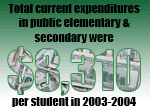Stripping For Public Education
Things are so bad in Las Vegas' public schools that even strip clubs are doing their part to support public education:
The Clark County School District kicked off the first day of school Wednesday with scant resources. But it got a major donation from the scantily clad.When it comes to donations of cash, I guess beggers can't be choosers.
The same day the nation's fifth largest school district began the year with some 400 teaching vacancies, the nonprofit corporation that supports it, the Public Education Foundation, accepted a $2,500 donation from a strip club, Scores Las Vegas.
"Thank you for your donation of $2,500, received on August 30, 2006," said a letter from foundation president Judi Steele to Scores' marketing director, Shai Cohen. "Thank you again for your willingness to support our community and invest in our children ... our future."
Scores raised the funds at an Aug. 23 back-to-school event called "Detention" that featured strippers dressed as teachers, schoolgirls and librarians.
"It's back to school time and you know what that means. Detention for everyone who has been bad!" one advertisement read.
The performers peeled off clothes and offered lap dances to customers, Cohen said. Patrons also left more than $1,000 donations in a jar that the club said would go to the Clark County School District. Scores matched the donations roughly dollar for dollar, he said.
"In this town, money is money, regardless," Cohen said. "We're a respectable business. We pay taxes like everybody else. We have a business license. It's for a good cause."
"Education is very important," he said.
The foundation's director of development, Deb Hegna, said the donation was gratefully accepted.
"From any licensed, legitimate business, we're certainly happy to accept donations," she said, adding the gentleman's club told them it had raised the funds at a charity event.
The money was earmarked for the foundation's exchange program, which provides new or gently used materials, supplies and computers to Clark County teachers for free or little cost.
The district, a sprawling area covering 8,000 square miles in southern Nevada with more than 300,000 students expected this year, is the fastest growing in the nation, said school district spokesman Steve Lombard.
The district has had difficulty hiring teachers to keep pace with growth, especially with the high cost of housing in southern Nevada, he said. The state ranks 46th in the nation in per-pupil spending, according to a U.S. Census Bureau report.
The district's associate superintendent, Karlene Lee, said the district was not informed about and did not condone the flier used to promote the strip event.
Lee had no comment on the fundraising activities of the foundation, a separate entity which raises about $5 million a year.
"The donation was made to the foundation and for the inner workings of how that functions, you can contact the foundation again."
On the other hand, these developments put a whole new spin on possible offerings for "adult night school."
Related: For those who feel the need, the "Scores Las Vegas" website may be accessed from the WaPo article, (bottom of page 2) but it may not be (obviously) "work safe."





















